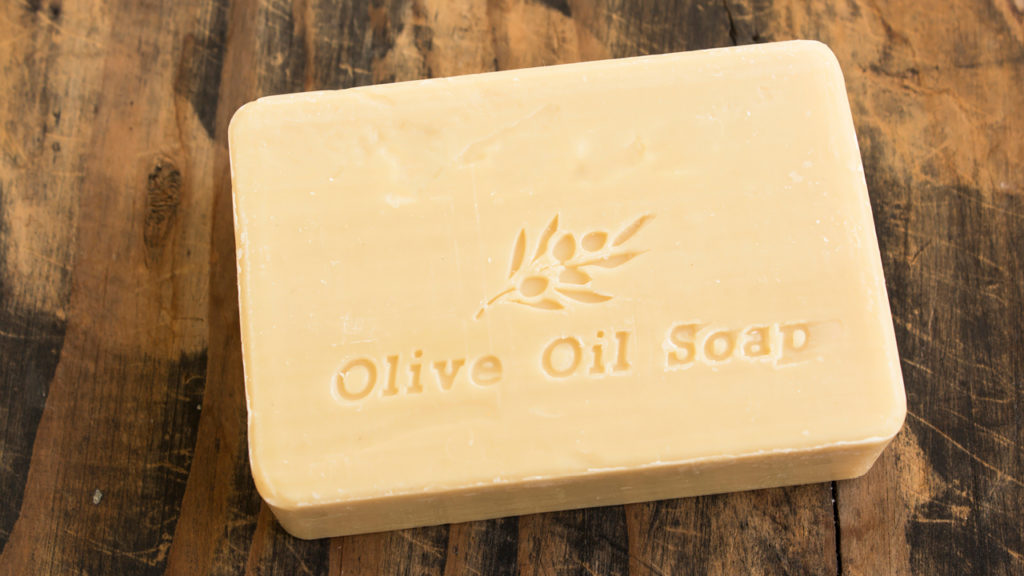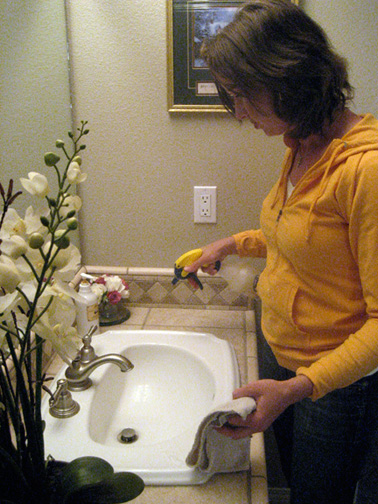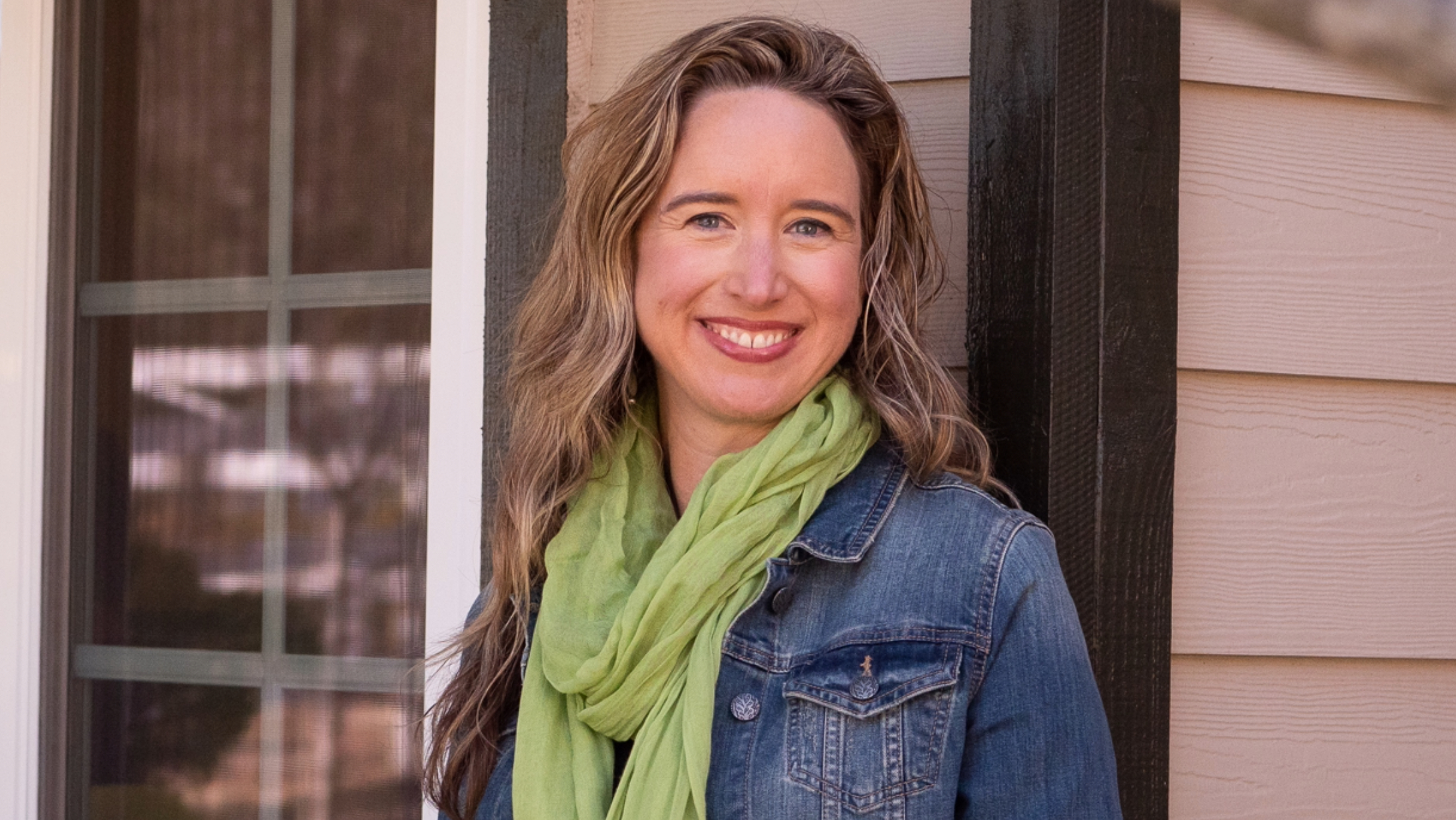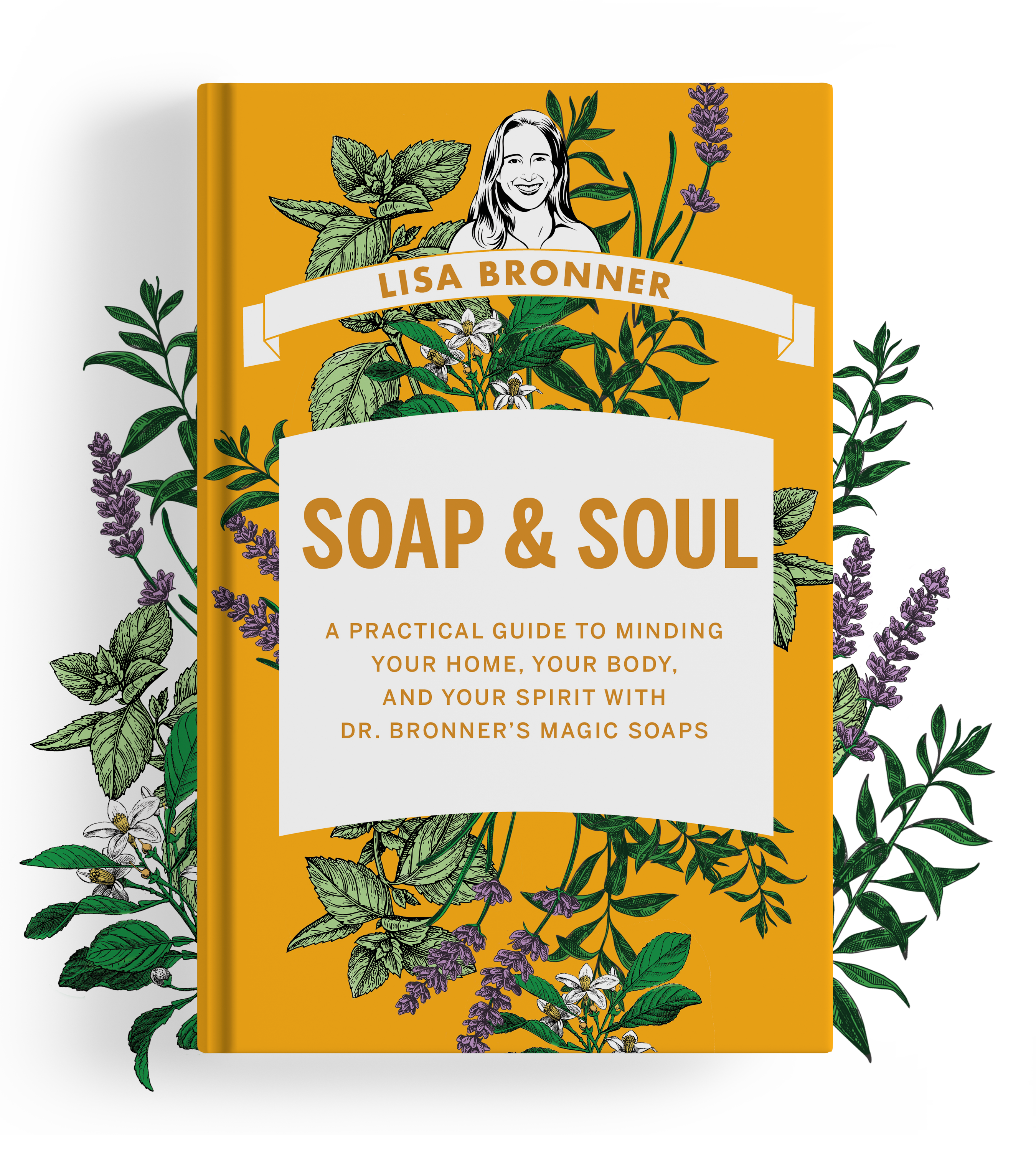
Soap works! Somewhere along the way in recent years, we’ve accepted the idea that soap isn’t good enough. The myth persists that only potent, synthetic antibacterial agents are legitimate cleansers and soap simply isn’t effective.
This idea stems partially from the pursuit of efficiency, the desire for cleanliness, and the promotion from advertisers. Although it is true that products such as these do clear away soap scum faster and kill germs “on contact”, if you look at the long term costs and effects, little time or anything else is saved. Rarely does a product do only one thing, such as kill germs. One very common ingredient, Triclosan, which is in everything from toothpaste to bathroom cleaners to hand wash to socks and cutting boards, has also demonstrated in recent studies the ability to alter hormones and create antibiotic-resistant superbugs. Quite a multitasking product. So, down the road when our bodies get sick or start to malfunction, will the few minutes we saved cleaning the bathroom really matter?

The idea that soap doesn’t clean well is also unfounded. Terms such as “antibacterial” actually have carefully regulated definitions. “Antibacterial” and “disinfectant” means that the product must kill a certain percentage of germs, and such products are monitored as pesticides by the EPA on both the federal and the state level. Dr. Bronner’s Castile Soaps and Sal Suds are not a pesticides. They do not kill, but rather remove dirt and grime. Because soap removes and doesn’t kill, we can’t use the terms disinfectant. However, since our goal is to get rid of the germs, this is exactly what it does. I guess we need a new term. How about calling soap an “eliminator” or “eradicator” or “germ bouncer.” Do you have a suggestion?
So if you’re still really paranoid about germs and suspicious of simple soap, grab hold of a bottle of Tea Tree Castile Soap or even a bottle of pure tea tree oil (undiluted this can burn, so use care). Although the U.S. government doesn’t yet recognize it as such, tea tree oil is a naturally occurring antibacterial agent.
In comparing the cost of conventional bathroom cleaners versus a homemade soap solution, both the upfront and long term calculations favor the soap solutions. The recipe I use at the end of this post costs roughly $1.10, compared to an estimate of $2.99 for a bottle of conventional spray cleaner. (These numbers and the recipe are from Karen Logan’s fabulous book, Clean House, Clean Planet. I highly recommend this book for ways to replace toxic conventional products.)
To continue with the evils of conventional cleaners, let’s assume that you wear gloves when using them, so they don’t come into contact with your skin during application. (I rarely remember to wear my gloves, if I even know where I put them. Usually I’m cleaning the bathroom while my kids are in the tub, so I can’t leave the room to find my gloves anyways.) But consider what about the little residue that may be left on the tub, that ends up in the bathwater which the kids inevitably drink as they blow bubbles? What about what might remain on the toilet seat, and be absorbed through the skin of their bottoms? What about the little bit that ends up on the counter, which the kids touch and then eat their sandwiches? What if this happens every day – several times a day – for their entire childhood? How much ends up in their little, developing bodies?
How to make an All-Purpose Household Cleaning Spray
Use this All-Purpose Cleaning Spray to clean all manner of hard surfaces, including countertops, light switches, your fridge, wooden door jambs, and even spots on carpets!
Fill a 1 quart (1 L) spray bottle nearly to the top with water. Add 1/4 cup (60 mL) of your favorite Dr. Bronner’s Castile Soap or 1 Tbsp. (15 mL) Sal Suds and optionally, 20-30 drops of tea tree oil. Spray on surface and wipe off with a damp cloth.



[…] I’ve written that discuss how soap works and why it’s all you need: “Who Gave Soap a Bad Name” – one of the first blog posts I ever wrote […]
[…] Castile soap is considered a disinfectant, and is not antibacterial. To be considered antibacterial, a solution must kill 99.9% of germs. To be a disinfectant, a solution must kill 99% of germs. Adding tea tree oil, which is a natural antibacterial oil, can help make your solution antibacterial, but please note, tea tree oil is toxic to cats. […]
I recently took a half a cup of rubbing alcohol, and a full cup of bronners, poured it into a hand soap dispenser and voila!
The trouble I had with the water dilution was eventually it separates (big surprise: oil v water) and would clog up the dispenser.
The mix of alcohol and bronners stays mixed, doesn’t clog the dispenser, and I feel like the alcohol has the “anti-bacterial” component you are discussing here.
One, am I way off base? Two, am i defeating the purpose of a natural soap by adding alcohol?
Hi Norman – Thanks for sharing! Nope, you are not way off base at all. This functionally is what is called Green Soap in the tattooing industry. You can buy this sort of combination ready made, but you have pretty much made your own. This is still a close to nature product. Alcohol can be made from nearly every sugar containing plant. The alcohol we use in our hand sanitizers comes from non-GMO corn.
[…] soap is actually necessary. I had a look at this article on anti-bacterial soap and this article on soap. Something that might have more clout is the UK Government’s 5 year plan to tackle […]
Hello Lisa,
Thanks for all the time you take to answer our questions. I just wanted to get clarification if all the Dr. Bronner’s Castile Soaps were considered a disinfectant or if it was just the tree oil one? Is the lavender just as effective as the tree oil one?
Hi Jefferson- Dr. Bronner’s Castile soaps – that’s any scent, as well as Sal Suds – is part of the “disinfectant” category. The term “disinfectant” means the product must get rid of 99% of germs. Soap will not kill bacteria or anything else, but it does eliminate it. Soap works by removing. It latches on to dirt, grime, germs, etc. and takes them away. I covered this in more detail in my blog, “Ditch the Antibacterial” (https://www.lisabronner.com/ditch-the-antibacterial-soap-is-all-you-need/). Studies show that tea tree essential oil does have antimicrobial properties. To give your cleaning solution an extra boost, use our Tea Tree Castile soap or add tea tree oil (taking care as pure essential oil on skin can burn) to the solution. I’m not aware of any research indicating the same is true of lavender essential oil.
hi,
can you tell us, does Dr Bronners soap/tea tree oil or your recipe kill the NoroVirus?
thanks
Hi Philip- Oh boy! I sure hope you’re not currently up against the Norovirus. With thorough and frequent hand washing, Dr. Bronner’s Castile soap will help protect you from Norovirus. In fact, the American Centers for Disease Control & Prevention (CDC) advises that hand washing with soap and water is the best method of prevention. Tea tree essential oil is a natural antibacterial, so use Tea Tree Castile soap for extra prevention. To clarify, soap will not kill bacteria or anything else though. The only thing that kills bacteria is a pesticide, and soap is not that. Dr. Bronner’s soaps are part of the “disinfectant” category, which means they eliminates 99% of germs. Soap does this by latching on to germs, dirt, grime, and removing them. There’s a lot more discussion on this in my post, Ditch the Antibacterial: Soap is All You Need at https://www.lisabronner.com/ditch-the-antibacterial-soap-is-all-you-need/.
Hi Lisa,
I think liquid castile soap with essential oils is better than mass market surface cleaners from a fragrant point of view, of course it take away germs and dirt but what about the fact that castile soap has unsaponifiables, which make it not the best choice for clothes washing, and also as a surface cleaner it will also leave unsaponifiable traces!
I think my question should be; how do you see the effect of the unsaponified content in liquid castile soap on surface cleaners?
Hi Ahmed- The saponified content of the soap will pick up any unsaponified content.
[…] And another about defending the underdog: Who Gave Soap a Bad Name? […]
[…] What I Mean by “Green” Deciphering Soap and Bodycare Ingredients – Beware of the “-eth” Who Gave Soap a Bad Name Sal Suds in a Spray Bottle How to Make A Castile Soap Household Cleaner Spray Open Wide Falling Off […]
Hi Lisa,
I want to use the Castile soap and essential oils to make an every day, all purpose, disinfecting spray. I already bought the lavender Castile soap and I have tea tree oil. Can you tell me the best recipe to use so that I clean and disinfect every day items (countertop, doorknobs, etc)? Should I also add lavender oil or is that superfluous since I have the lavender Castile soap? Thank you!
Hi Joy – To make an all-purpose spray with Castile soap, add 1/4 cup of the Castile (any scent) to a 1 quart of water in a spray bottle. Spray your surfaces and then wipe off with a damp microfiber cloth. Lavender essential oil smells great, but tea tree essential oil has natural antimicrobial properties for an extra cleaning boost. You can add 1/4 tsp of tea tree essential oil to cleaning spray. A word about disinfecting though – soap grabs and removes dirt and germs. Only a pesticide kills germs, but soap removes them. Here’s a recent blog post with more on that topic: https://www.lisabronner.com/ditch-the-antibacterial-soap-is-all-you-need/
Hi Lisa. I was hoping to find out more about the inclusion of tea tree oil in the all-purpose cleaner. I’ve heard that tea tree oil is bad for cats and dogs, making me a little hesitant on using my all-purpose spray! Would you know if this cleaner is safe to use around pets? Can you offer more information/advice on this cleaner with the tea tree oil and pets? Many thanks!
Hi Joy- As long as you’re diluting the Castile soap with water in a spray bottle, the risk is very minimal. The essential oils in our soap are only 2% and you’ll be heavily diluting it and then wiping it off. If you’re adding your own Tea Tree essential oils, use no more than 15-20 drops per 32 ounces. If you prefer, you can use the Unscented Castile soap which contains no essential oils.
[…] * Check out one of my previous posts, “Who Gave Soap a Bad Name”. […]
I purchased the Hemp Almond soap for use in the shower (body/face). Can I add some Melaluca and/or Lavender essential oil + hot water to clean the bathrooms/kitchen or do you recommend a different Dr. Bronner’s for cleaning bathrooms/kitchen?
Hi Rebecca – You can definitely use the Almond and add in the essential oils and hot water for bathroom cleaning. You can make an All Purpose Spray with it using 1/4 c. (60 mL) in a quart (liter) of water.
I am using the peppermint Castile soap and this is my first time ever using it. I added a small amount to a 160z. Bottle of hot water and wiped my table and countertops down. I had seen something about rinsing it off of countertops….. I’m a tad confused about that. I’m also wanting to use it as hand and body soap and am unclear of the dilution scale of that.
Hi Chelsey – Welcome to Dr. Bronner’s! If you wipe down with a damp cloth (I recommend microfiber), you don’t need to rinse it. The cloth will pick up the soap and the dirt. For hand and body, I don’t predilute since the water that’s already on my skin dilutes it. For hands, a couple drops will do. For the body, I use a wet washcloth and a good squirt (probably works out to about 1 tsp. of soap) for my whole body.
I’ve been using Dr. Bronner’s soap for about a year now and love it. Body wash, baby wipes, etc. I just picked up a bottle of Peppermint soap but I can’t find any info on this, whether or not I can use it while pregnant. I know peppermint oil is not safe in pregnancy but is this diluted enough to be safe?
Hi Cathy – Yes, the Peppermint Castile Soap is safe to use during pregnancy. The concentration of the peppermint essential oil is 2%. The combination of that dilution along with the fact that soap is a “wash off” product and doesn’t have a tremendous amount of time to penetrate the skin, makes it perfectly safe for pregnancy. This goes for all of our soaps. I looked into it myself when I was expecting.
So if a disinfectant kills 99% of the germs, I’m assuming that is what the straight soap does, as a disinfectant. When you mix it with water to make a cleaner for the bathroom or kitchen, does it lose its effectiveness, since it’s so diluted? I am curious to try a bottle sometime as I’m trying to move away from commercial cleaners, and my family doesn’t like the smell of vinegar, which I have also been using. 🙂
Oh, and if I do try it, I’ll use the unscented, and I won’t add tea tree. We have cats, and they often jump up on the counter on their way to the window. I’ve read tea tree is toxic to cats, and don’t want to take the chance of them absorbing it through their paws. 🙂
Hi Emily – Soap works by essentially grabbing germs/grime/dirt on one side and grabbing water on the other. The soap actually works best at grabbing those germs when it is properly diluted. It needs the water. My dilution recommendations can certainly be tweaked to the occasion – if you’re facing a super grimy situation, you’ll need a higher soap concentration in order to have enough soap molecules to grab on to all those grime molecules. If you have a light cleaning situation – let’s say a window – you might want to do a more diluted concentration.
I know that a lot of these mixtures call for water to be added- but how do you keep the mixture from smelling like dirty mop. I noticed that after a few days the water in the bottle will smell like mold/mildew. Help!
Hi Margaret – That doesn’t sound good. Here are a couple thoughts – starting with the basics, make sure the bottle is really clean. If you’re making a fresh batch, rinse the bottle thoroughly of the previous batch. Adding the water dilutes the essential oils which are giving it its scent. You can add extra essential oils to boost it back up – perhaps 20 drops of sweet orange oil or lavender oil. Another thought is to make smaller batches, or to add more soap to the dilution.
Your solution most likely is not turning rancid so quickly – that would only happen if the dilution were left several months. You can check this by seeing if the solution still cleans. My top guess is the dilution of the oils is lowering the scent too much. The essential oils are at a 2% concentration in the soap itself, so if you are cutting that by 16, you get a really diluted amount.
Dear Lisa, thankyou for a such lovely blog you have here… ^_^
anw, it is save using dr.bronners pure baby liquid with eczema skin during pregnancy?
or do you have any advice for my very dry skin (getting terribly more dry while pregnancy) ?
thanks a bunch for your reply 🙂
Hi Felcia – Thanks! The soap is fantastic and perfectly safe for use during pregnancy. During pregnancy, I remember itching all over, and it was Dr. Bronner’s coconut oil that came to my rescue. I rubbed this on my belly and had my husband do my back.
Best wishes with your little one!
Thank you!
Hi! Is the almond one safe to use to make baby wipes? With 1 3/4 c water boiled and 3 tbsp soap?
Hi Tamara – Yes, it is safe during pregnancy. There is some concern with essential oils when they are applied to the skin in higher concentrations and in “leave-on” products such as massage oils or lotions. HOwever, in our soaps, there is a 2% concentration, and it is rinsed off, so very little of the essential oils remain on your skin.
All the best,
Lisa
Is there an answer for Lynn’s question concerning mrsa.?
I’m sorry I didn’t see the MRSA question before. To answer, let’s take a look at how soap works. Soap is not a pesticide, which means it does not kill. Antibacterial products, which have almost entirely been shot down by the FDA, were designed to kill. Soap works by removing. It latches on to dirt, grime, germs, etc. and takes them away. That means the short answer is, no, soap will not kill MRSA or anything else. Soap eliminates it, though. Both the CDC and FDA have stated that washing with soap and water is your best option for cleaning. By no means is soap alone going to get rid of a MRSA infection. Medical attention is essential. However, ironically, antibacterial agents, such as triclosan, that people thought were the key to protecting themselves from Staph and MRSA, are now being seen as the potential cause for promoting such antibiotic resistant superbugs.
For more on this, check out the FDA’s ruling on antibacterial agents. I am referring in particular to the section that says, ” In addition, laboratory studies have raised the possibility that triclosan contributes to making bacteria resistant to antibiotics. Some data shows this resistance may have a significant impact on the effectiveness of medical treatments, such as antibiotics.”
Is the soap safe for nursing and pregnancy? I know some essential oils are unsafe during pregnancy?
@Jill – Thanks for bringing up this issue. It looks like the research is targeting using tea tree oil alone for disinfecting. However, in our soap, which disinfect on their own already, there’s not going to be this cleansing gap. The tea tree oil adds to the cleaning ability that’s already there. There is a 2% concentration of the essential oil in our soap. If you go greater than that, there are a few other risks. First, tea tree oil can burn at a high concentration. Never touch the oil straight. Also, other concerns have been raised about the oil’s affect on hormone levels, especially in boys and pregnant women. There is no concern over the Dr. Bronner’s levels because our concentration is low, and our product washes off, unlike the oil in a lotion which remains on the skin and is more fully absorbed.
It’s good to keep learning more about the products we’re using. Thanks for bringing this up!
~Lisa
Please help I have MRSA and am looking for natural product to kill the bacteria on my skin. the article warns against any concentration lower than 4% tee tree oil. you say there is only 2% tee tree oil in Dr Bronner’s soap. so does that mean that the Dr Bronner’s soap does not kill MRSA and other bacteria?
btw, just used it on my hair, first time using the product. Wow the lather! My hair is puffed. Seems to have dried my face a bit. I want to use it for housecleaning. Hear it degreases and cleans a tub like nothing else. “Real” soap.
I’ve been reading on tea tree oil and there’s concern that it too contributes to superbugs. I ended up returning the tea tree Dr. Bronners for baby-mild.
Low concentrations are a major concern but I think in general, too, just as using alcohol, triclosan, etc.. Over-de-germing is becoming a serious problem and hazard to our health and environment.
I didn’t save the articles, but here is one: http://www.netdoctor.co.uk/interactive/news/theme_news_detail.php?id=18065009&tab_id=106
Carmen – I only use the pure castile soap on my face. I have been through the wringer with facial products – trying everything from conventional stuff to the stuff only available through dermatologists. Then I returned to Dr. B’s pure castile Tea Tree. It cleared up my acne and reduced redness. For the first couple months, my face did feel a little tight, so I followed up with our Lavender Coconut lotion. That worked great, too. Now, I guess my skin has gotten used to the soap because I don’t need the moisturizer anymore. If you want to start with the gentlest and work your way up, try the unscented Baby Mild first.
Thanks Lisa for all your tips. I have enjoyed watching your videos. Tell me something do u ever wash your face with the soap? I wish there was a line of products for your face.
Loved all your green ideas.
Good to know that the tea tree soap is a natural antibacterial. I was keeping 2 bottles of soap in the kitchen… Dr. B’s for most things and a bottle of harsh antibacterial for when I handled raw meats. Now I can just use the one (by chance is the TT type). Thank you for the info.